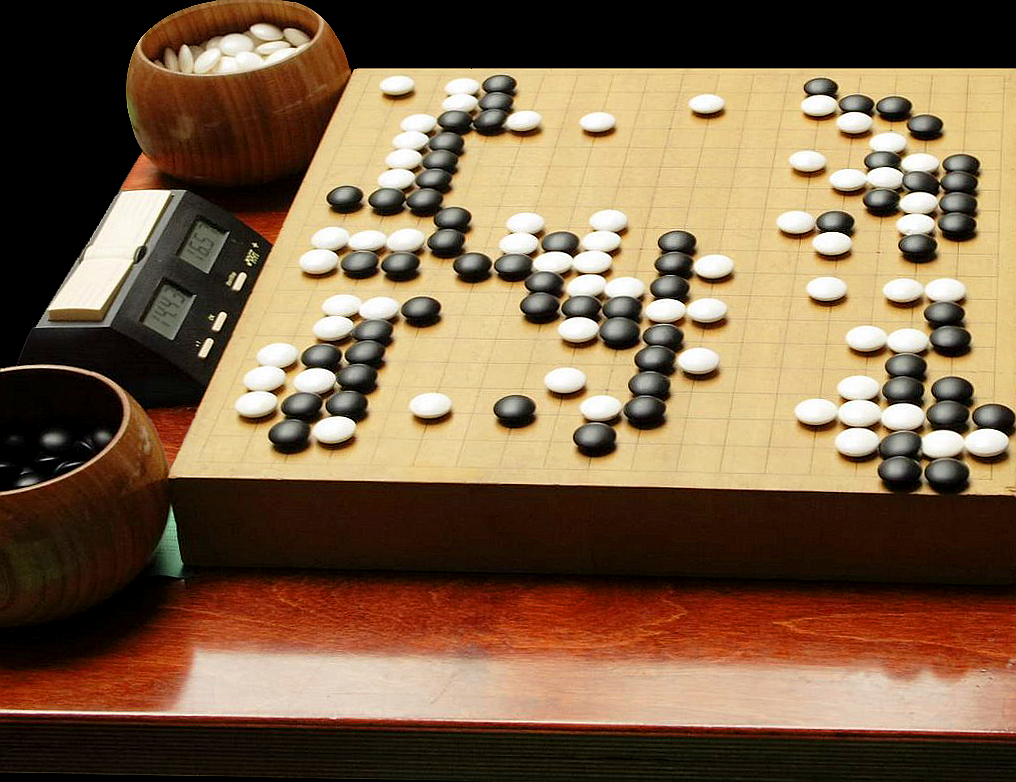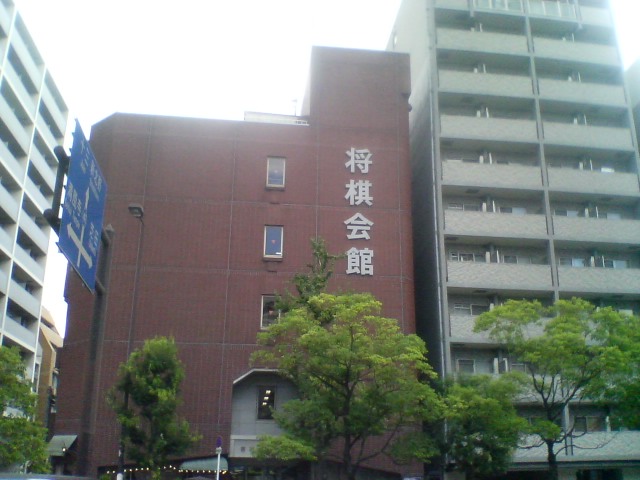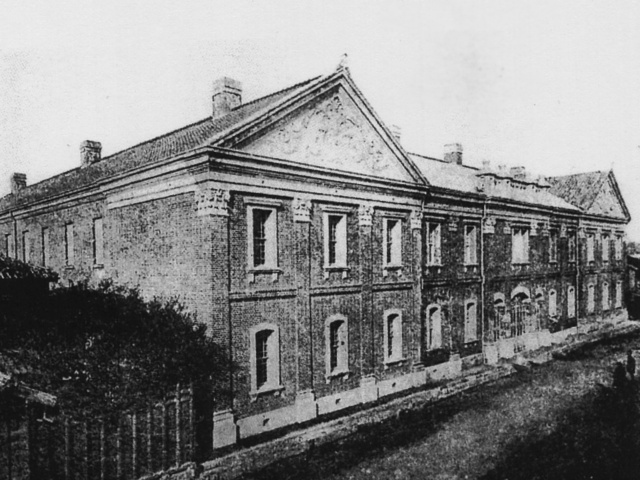|
Hiroaki Yokoyama
is a Japanese professional shogi player ranked 7-dan. Early life and apprenticeship Hiroaki Yokoyama was born on October 16, 1980, in Tama, Tokyo. He was accepted into the Japan Shogi Association's apprentice school at the rank of 6-kyū as a student of shogi professional in August 1993, was promoted to 1-dan in July 1999, and finally obtained full professional status and corresponding rank of 4-dan in October 2002. Shogi professional Promotion history The promotion history for Yokoyama is as follows: * 6-kyū: 1993 * 1-dan: 1999 * 4-dan: October 1, 2002 * 5-dan: October 30, 2007 * 6-dan: December 7, 2012 * 7-dan: September 11, 2019 Awards and honors Yokoyama received the Japan Shogi Association's 42nd Annual Shogi Award for "Most Consecutive Victories" for April 2014March 2015. Personal life Yokoyama is a graduate of Chuo University , commonly referred to as or , is a private flagship research university in Tokyo, Japan. Founded in 1885 as Igirisu Hōritsu Gakkō (th ... [...More Info...] [...Related Items...] OR: [Wikipedia] [Google] [Baidu] |
Tama, Tokyo
is a Cities of Japan, city located in the western portion of Tokyo Metropolis, Japan. , the city had an estimated population of 148,285 in 73,167 households, and a population density of . The total area of the city was . Geography Tama is located in the foothills of the Okutama Mountains of southwestern Tokyo, known as Tama Hills, which spans Tokyo and Kanagawa Prefecture. The entire region is historically referred to as Tama; therefore there are many place names scattered throughout the area with references to the name "Tama" which are not within the city limits. The Tama River marks the city's northern boundary, and Kanagawa Prefecture is to the south. Its southern half forms part of the Tama New Town project, Japan's largest residential development, constructed in the 1970s. Surrounding municipalities Tokyo Metropolis *Inagi, Tokyo, Inagi *Fuchū, Tokyo, Fuchū *Hachiōji, Tokyo, Hachiōji *Machida, Tokyo, Machida *Hino, Tokyo, Hino Kanagawa Prefecture *Kawasaki, Kanagawa, K ... [...More Info...] [...Related Items...] OR: [Wikipedia] [Google] [Baidu] |
Dan (rank)
The ranking system is used by many Japanese, Okinawan, Korean, and other martial art organizations to indicate the level of a person's ability within a given system. Used as a ranking system to quantify skill level in a specific domain, it was originally used at a Go school during the Edo period. It is now also used in most modern Japanese fine and martial arts. Martial arts writer Takao Nakaya claims that this dan system was first applied to martial arts in Japan by Kanō Jigorō (1860–1938), the founder of judo, in 1883, and later introduced to other East Asian countries. In the modern Japanese martial arts, holders of dan ranks often wear a black belt; those of higher rank may also wear either red-and-white or red belts depending on the style. Dan ranks are also given for strategic board games such as Go, Japanese chess ('' shōgi''), and renju, as well as for other arts such as the tea ceremony (''sadō'' or ''chadō''), flower arrangement (''ikebana''), Japanese call ... [...More Info...] [...Related Items...] OR: [Wikipedia] [Google] [Baidu] |
Professional Shogi Player
A professional shogi player (将棋棋士 ''shōgi kishi'' or プロ棋士 ''puro kishi'' "professional player") is a shogi player who is usually a member of a professional guild of shogi players. There are two categories of professional players: regular professional and women's professional. All regular professional shogi players are members of the Japan Shogi Association (JSA). However, only regular professional players, who are all male, are considered to be full-fledged members. Women's professional players belong to groups distinct from regular professional players. In Japanese, the term 棋士 ''kishi'' only refers to regular professional players to the exclusion of women's professionals, who are termed 女流棋士 ''joryū kishi.'' History During the Edo period (1603-1868), shogi followed an iemoto system centered around three families (schools): the , the and the . Titles such as Meijin were hereditary and could only be held by members of these three families. These ... [...More Info...] [...Related Items...] OR: [Wikipedia] [Google] [Baidu] |
Dan (rank)
The ranking system is used by many Japanese, Okinawan, Korean, and other martial art organizations to indicate the level of a person's ability within a given system. Used as a ranking system to quantify skill level in a specific domain, it was originally used at a Go school during the Edo period. It is now also used in most modern Japanese fine and martial arts. Martial arts writer Takao Nakaya claims that this dan system was first applied to martial arts in Japan by Kanō Jigorō (1860–1938), the founder of judo, in 1883, and later introduced to other East Asian countries. In the modern Japanese martial arts, holders of dan ranks often wear a black belt; those of higher rank may also wear either red-and-white or red belts depending on the style. Dan ranks are also given for strategic board games such as Go, Japanese chess ('' shōgi''), and renju, as well as for other arts such as the tea ceremony (''sadō'' or ''chadō''), flower arrangement (''ikebana''), Japanese call ... [...More Info...] [...Related Items...] OR: [Wikipedia] [Google] [Baidu] |
Japan Shogi Association
The , or JSA, is the primary organizing body for professional shogi in Japan. The JSA sets the professional calendar, negotiates sponsorship and media promotion deals, helps organize tournaments and title matches, publishes shogi-related materials, supervises and trains apprentice professionals as well as many other activities. History For much of its early history, shogi followed an iemoto system centered around three families (schools): the , the and the . The Meijin title was hereditary and could only be held by members of these three families. These three schools were supported by the Tokugawa shogunate and thus controlled the professional shogi world up until 1868 when the Meiji Restoration began. By the time , the eighth and last head of the Itō school and the 11th Hereditary Meijin, had died in 1893, the influence of the families had decreased to such an extent that they had no real power at all. In 1921, there were three groups of professional players in the Tokyo ar ... [...More Info...] [...Related Items...] OR: [Wikipedia] [Google] [Baidu] |
Professional Shogi Player
A professional shogi player (将棋棋士 ''shōgi kishi'' or プロ棋士 ''puro kishi'' "professional player") is a shogi player who is usually a member of a professional guild of shogi players. There are two categories of professional players: regular professional and women's professional. All regular professional shogi players are members of the Japan Shogi Association (JSA). However, only regular professional players, who are all male, are considered to be full-fledged members. Women's professional players belong to groups distinct from regular professional players. In Japanese, the term 棋士 ''kishi'' only refers to regular professional players to the exclusion of women's professionals, who are termed 女流棋士 ''joryū kishi.'' History During the Edo period (1603-1868), shogi followed an iemoto system centered around three families (schools): the , the and the . Titles such as Meijin were hereditary and could only be held by members of these three families. These ... [...More Info...] [...Related Items...] OR: [Wikipedia] [Google] [Baidu] |
Google Books
Google Books (previously known as Google Book Search, Google Print, and by its code-name Project Ocean) is a service from Google Inc. that searches the full text of books and magazines that Google has scanned, converted to text using optical character recognition (OCR), and stored in its digital database.The basic Google book link is found at: https://books.google.com/ . The "advanced" interface allowing more specific searches is found at: https://books.google.com/advanced_book_search Books are provided either by publishers and authors through the Google Books Partner Program, or by Google's library partners through the Library Project. Additionally, Google has partnered with a number of magazine publishers to digitize their archives. The Publisher Program was first known as Google Print when it was introduced at the Frankfurt Book Fair in October 2004. The Google Books Library Project, which scans works in the collections of library partners and adds them to the digital invent ... [...More Info...] [...Related Items...] OR: [Wikipedia] [Google] [Baidu] |
Annual Shogi Award
The Annual Shogi Awards (将棋大賞 ''shōgi taishō'') are a number of prizes awarded yearly by the Japan Shogi Association to professional and amateur shogi players who have achieved particular success. The first Annual Shogi Awards were presented in 1974. Winners Below is a table of the awards given and the award winners for each year. Kōzō Masuda Awards The Kōzō Masuda Award (升田幸三賞 ''Masuda Kōzō shō'') and the Kōzō Masuda Special Prize (升田幸三賞特別賞 ''Masuda Kōzō shō takubetsu shō'') are two prizes awarded to professional or amateur players who have made an outstanding contribution to the development and evolution of shogi openings by way of innovation or excellence in shogi theory or tactics. The awards are named after the innovative player, Kōzō Masuda. The Masuda Award is given out yearly since 1995 while the Masuda Special Prize is awarded infrequently. Winners Masuda Award * 1995 (22nd Annual Shogi Awards) Kunio Naitō for the S ... [...More Info...] [...Related Items...] OR: [Wikipedia] [Google] [Baidu] |
Chuo University
, commonly referred to as or , is a private flagship research university in Tokyo, Japan. Founded in 1885 as Igirisu Hōritsu Gakkō (the English Law School), Chuo is one of the oldest and most prestigious institutions in the country. The university operates four campuses in Tokyo: the largest in Hachiōji (Tama campus), one in Bunkyō (Korakuen campus), and two others in Shinjuku (Ichigaya and Ichigaya-Tamachi campuses). Chuo is organized into six faculties, ten graduate schools, and nine research institutes. There are also four affiliated high schools and two affiliated junior high schools. When written in Chinese characters, Chuo University shares the same name with National Central University in Taiwan and Chung-Ang University in South Korea. History Early days: 1885–1920 Chuo was founded as the in 1885 at Kanda in Tokyo by Rokuichiro Masujima together with some group of 18 young lawyers led by him. Before 1889, the school moved and was renamed to Tokyo College of L ... [...More Info...] [...Related Items...] OR: [Wikipedia] [Google] [Baidu] |
Saori Shimai
is a Japanese women's professional shogi player ranked 2-dan. she is serving as an executive director of Ladies Professional Shogi-players' Association of Japan (LPSA). Women's shogi professional Promotion history Shimai's promotion history is as follows: * Women's Professional Apprentice League: April 1995 * 2-kyū: April 1, 1996 * 1-kyū: April 1, 2001 * 1-dan: April 1, 2003 * 2-dan: January 16, 2012 Note: All ranks are women's professional ranks. LPSA director Shimai was chosen to be a director of the LPSA for the first time in February 2014, and reelected to the same post in February 2016. In February 2018, she was chosen to be one of the organization's two executive directors. She was reelected as an executive director in 2020 and 2022. Personal life Shimai is married to professional shogi player Hiroaki Yokoyama is a Japanese professional shogi player ranked 7-dan. Early life and apprenticeship Hiroaki Yokoyama was born on October 16, 1980, in Tama, Tokyo. He ... [...More Info...] [...Related Items...] OR: [Wikipedia] [Google] [Baidu] |
Sports Hochi
, previously known as , is a Japanese-language daily sports newspaper. In 2002, it had a circulation of a million copies a day. It is an affiliate newspaper of ''Yomiuri Shimbun''. Reports 19 September 1939: SS Scharnhorst The Hochi Shimbun newspaper was mentioned in an article in The Singapore Free Press and Mercantile Advertiser on September 20, 1939 concerning the conversion of the SS Scharnhorst into the escort carrier Shin'yō by the Imperial Japanese Navy. See also *Hochi Film Award *Golden Spirit Award The Golden Spirit Award is given annually to the Nippon Professional Baseball (NPB) player who "best exemplifies the game of baseball, sportsmanship, community involvement and the individual's contribution to his team", as voted on by members of th ... References External links * Daily newspapers published in Japan Sports newspapers published in Japan {{sports-stub ... [...More Info...] [...Related Items...] OR: [Wikipedia] [Google] [Baidu] |
1980 Births
__NOTOC__ Year 198 (CXCVIII) was a common year starting on Sunday (link will display the full calendar) of the Julian calendar. At the time, it was known as the Year of the Consulship of Sergius and Gallus (or, less frequently, year 951 '' Ab urbe condita''). The denomination 198 for this year has been used since the early medieval period, when the Anno Domini calendar era became the prevalent method in Europe for naming years. Events By place Roman Empire *January 28 **Publius Septimius Geta, son of Septimius Severus, receives the title of Caesar. **Caracalla, son of Septimius Severus, is given the title of Augustus. China *Winter – Battle of Xiapi: The allied armies led by Cao Cao and Liu Bei defeat Lü Bu; afterward Cao Cao has him executed. By topic Religion * Marcus I succeeds Olympianus as Patriarch of Constantinople (until 211). Births * Lu Kai (or Jingfeng), Chinese official and general (d. 269) * Quan Cong, Chinese general and advisor ( ... [...More Info...] [...Related Items...] OR: [Wikipedia] [Google] [Baidu] |







